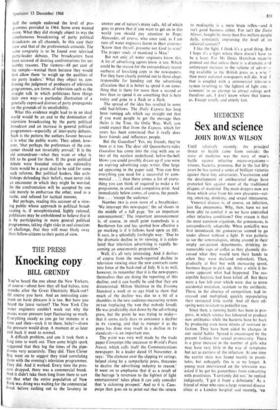Knocking copy
THE PRESS BILL GRUNDY
You've heard the one about the New Yorkers, of course—about how they all had babies, nine months after the Great Electricity Black-out? Of course you have. And an interesting com- ment on basic pleasure it is too. But have you heard the latest variant? The New York City water engineers couldn't work out why the Mains water pressure kept fluctuating so much. Everything steady as you go for minutes at a time and then—sock it to them, baby!—.down the pressure would drop. A moment or so later and back it went to normal.
A difficult problem, and one it took them a long time to work out. Then some bright spark suggested that they log the times of the pipe- downs very accurately. They did. Then Clever Boy went on to suggest they tried correlating them with the evening's television programmes. They did. And it worked. Every time the pres- sure dropped, there was a commercial break. And it didn't take them long from there to sort out that what the entire population of New York was doing was waiting for the commercial break before rushing out to the lavatory to answer one of nature's many calls. All of which goes to prove that if you want to get on in this world you should pay attention to Pope; Alexander, of course, who once said, as I am sure all water engineers learnt in their cisterns: 'Know then thyself, presume not God to scan/ The proper study of mankind is Man.'
But not only all water engineers know this. A lot of advertising agents know it too. Which could be the reason for the extraordinary recent outburst of knocking copy in the newspapers. For they have clearly pointed out to those chaps responsible for handing out the advertising allocation that it is better to spend it on some- thing that is there for more than a second or two than to spend it on something that is here today and gone in a flash or a flush.
The spread of the idea has resulted in some odd bed-fellows. The Daily Express has long been runniiig ads which say straight out that if you want people to get the message then theirs is the True, the Onlie Way. Well, you could expect that from the Express, which for years has been convinced that it really does have friends and influences people.
But the Guardian? Yes, my friends, they've been at it too. The dear old Queensberry-rules Guardian has come into the ring with one or two of the nastiest underhand, below-the-belt blows you could possibly dream up if you were an aspiring advertising copy writer. One large ad appearing in the paper said, 'You can hire everything you need for a successful TV com- mercial . . .'; then there comes a list of every- thing you can think of required to make a Tv programme, in small and compulsive print. And immediately below comes, of course, the punch-
line . 'except the audience.'
Number two is even more of a breathtaker. 'We interrupt this newspaper,' the ad shouts in the middle of a full page, 'for an important announcement.' The important announcement is, of course, in small print (somebody is a Beethoven fan and has spotted how effective a pp marking is if it follows hard upon an fll). It says, in a splendidly forthright way: 'Due to the dramatic decline in iv viewing, it is calcu- lated that television advertising is rapidly be- coming an uneconomic proposition.'
Well, it's all very interesting. And it derives of course from the much-reported decline in television viewing since the new contracts came into force at the back-end of July. It is as well, however, to remember that it is the newspapers themselves that are doing the reporting of this decline, and it can hardly be said that they are disinterested. Milton Shulman in the Evening Standard a week or so ago tried to show that much of the decline was due to a bit of a shambles in the new audience-measuring system IICTAR (replacing the TAM that nobody loved). He was predictably shot down by the advertising press, but the point he was trying to make— that it seems early days to announce a decline in iv viewing, and that to trumpet it as the press has done may result in a decline in TV standards—is an important one.
The point was very well made by the trade paper Campaign (the successor to World's Press News), which calls itself the Communications newspaper. In a leader dated 15 November, it says: 'The clamour over the slipping Tv ratings, helped along by a sympathetic press, threatens to deafen the advertising industry to reason.' It went on to emphasise that if as a result of the barrage 'a reversion to the lightest of light entertainment' takes place it can only consider that 'a sickening prospect' And so it is. Cam- paign then goes on to point out that the return to mediocrity is a mere brute reflex—and it isn't good business either. For isn't the Daily Mirror. bought by more than five million people daily, constantly improving the level of . its editorial content?
I like the fight. I think it's a good thing. But I hope it's a tight where there doesn't have to be a loser. For Mr Denis Hamilton recently pointed out that unless there is 'a dramatic ad unforeseen increase in the volume of advert:s- ing available to the British press as a w!to' s' then more national newspapers will die. And f that is coupled with a commercial televisicn system reverting to 'the lightest of light entt -- tainment' in an attempt to attract ratings and therefore ads. I don't know where that leaves us. Except totally and utterly lost.














































 Previous page
Previous page